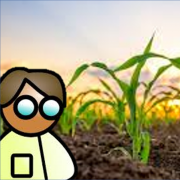Informational Interview with Professor C. Eduardo Vallejos, University of Florida
Informational Interview by Bryce Askey, ASPB Conviron Scholar 2018
Interviewee: Dr. C. Eduardo Vallejos
Interviewer: Bryce Askey
Date: November 13th, 2018
Dr. Vallejos is a professor in horticultural science at the University of Florida. I spoke with him about his career path, responsibilities as a professor, and general thoughts regarding his work. A summarized version of our conversation is below.
Can you give me an overview of your responsibilities as a professor at the university?
Primarily research and teaching. On paper, it’s about 80% research and 20% teaching, but in practice it’s more like 65% research and 35% teaching. As a researcher, I am responsible for publishing my work, and securing extramural funding to support my work with postdocs and students. Teaching is a combination of formal instruction in a classroom setting, and training graduate students working in my lab.
What did you study in your undergraduate and graduate degrees?
My undergraduate degree was in agronomy horticulture at the National Agrarian University in Lima, Peru. For my graduate degree, I studied plant physiology with a specialization in molecular biology at the University of California, Davis.
When do you think that you realized you wanted to become a professor?
I originally went to UC Davis with the intention of only getting a master’s degree and going to work in industry, but became intrigued by research. So after I got my master’s, I decided to go for a PhD and that’s when I knew I wanted to pursue research as a career.
What positions have you held prior to this one?
After my PhD, I stayed at UC Davis as a postdoc where I worked with a geneticist. After that, I received a fellowship at the Carnegie Institution of Plant Biology at Stanford, and that’s where I learned some molecular biology. Then, I moved to another postdoc at New Mexico State University where they had just opened a molecular biology lab. A friend of mine had just gotten a position at the lab and invited me to join. The lab had four walls and empty drawers, so we had to order everything. After about a year at that lab, I began to work at Los Alamos National Lab, still as part of the postdoc. There I learned about monoclonal antibodies. After that, I came to work at the University of Florida.
What skills have you found to be most vital in finding a job in this field?
Looking retrospectively, I think that receiving a strong training in the basic sciences – math, biology, physics, and plant physiology – during my undergraduate degree in Peru was extremely valuable. Even though I was in the agronomy program there, I had to take three semesters of calculus, physics with calculus, two or three semesters of chemistry, biochemistry, and so on. So even though it was an agricultural school, I didn’t learn any agriculture for two years. When I went to UC Davis, I was surprised to find that many students there hadn’t been required to do the same. In the plant physiology program, one of the required courses was physical chemistry, and a pretty important component of that class was differential equations. It was because of that class that quite a few students switched to botany. I think that if I hadn’t taken calculus as an undergraduate, I probably wouldn’t have passed p. chem, and wouldn’t have been able to complete my PhD in plant physiology. So in general, I think that having a strong background in the basic sciences gives you the ability to pursue nearly any opportunity that interests you. You never know where you’re going to end up, or what will be interesting to you a couple years in the future.
Are there any skills that you have developed since starting to work as a professor?
To find success in this field, you need to be able to write clearly and directly. This is especially critical when writing proposals, because you only have one chance. When writing a paper for publishing, a reviewer can tell you what needs to be improved, or if there is anything that is confusing or unclear, and you can resubmit it after making corrections. When you write a proposal, it has to be right. So that is something that I had to work on and improve. As a graduate student, yes, I wrote a dissertation, and two or three papers. But when you’re on your own, and your career depends on how well you can sell your ideas, it becomes a pretty serious business. If you can’t express your thoughts in an easily understandable and logical manner, you’re going to have a tough time selling your ideas, no matter how revolutionary or innovative they are.
I recently spent eighteen months working for the National Science Foundation as a rotating program director in one of the largest plant biology programs, so I had the chance to read more proposals than I ever wanted to. The one thing all the best proposals had in common was that they were incredibly easy to follow and understand. It was only once I took a step back that I realized the complexity of the idea that had just been proposed. The secret is clarity and logic. That’s it.
What is your favorite part of your job?
The thrill of discovery and being able to develop an idea to fruition.
What is the most challenging part of your job?
Time management – accommodating the things you want to do with the things you have to do.
Looking at your publications, I can see that you often work with researchers at different universities, or with researchers who specialize in a different field. Can you describe what benefit collaboration in this field brings?
Interdisciplinary collaboration is one of the aspects of my work that I enjoy the most. I’ve worked with plant pathologists, statisticians, biological engineers, quantitative geneticists, and so on. And going back to the point that I brought up earlier – a strong training in the basic sciences makes collaboration much easier because it allows you to understand what others do.
I am a strong advocate of what’s called a transdisciplinary approach. In short, a transdisciplinary approach is an approach that transcends disciplines. Students that complete an educational program that equally emphasizes math, biology, computer science, and so on, won’t have a volcanic view of science. With this transdisciplinary training, you can have a specialty in a given area, but shouldn’t see that as the only solution to the problem – other people are needed to complement your knowledge. In essence, a transdisciplinary approach gives you a global view of how you can attack a problem from different directions.
Where do your ideas for research projects come from?
Reading literature gives me ideas for projects, and also helps me to pay attention to what hasn’t been done – this is important when writing proposals. For example, if you take a technique that’s been used in maize and potatoes, and apply it to soybeans, that isn’t particularly innovative. Having other people to talk to ideas about is also very important – if someone else knows more about a particular field than I do, they will have a better judgement of whether a project is feasible or not.








Leave a Reply
Want to join the discussion?Feel free to contribute!